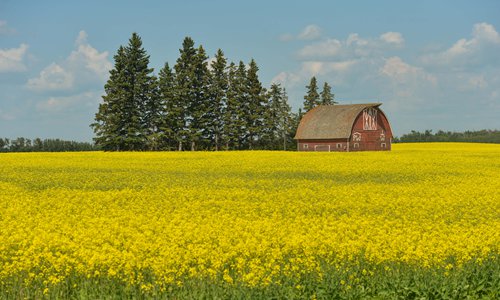SOURCE / INDUSTRIES
China better-placed in canola dispute with Canada
Ukraine, India could benefit as Canadian exporters’ position weakens

View of a canola field in Alberta, Canada in July 2018 Photo: IC
China can last longer in the spat with Canada over its canola, or rapeseed, purchases because of high inventory levels and easing demand in its major consumption regions, industry analysts said on Tuesday.
While Canadian canola accounts for the predominant portion of Chinese imports, there are new sources of supply that could stand to benefit from the dispute, such as Ukraine, India and Pakistan, analysts said.
China recently banned two Canadian rapeseed exporters - Viterra Inc and Canadian farming company Richardson International - in March after its customs authorities detected certain pests such as leptosphaeria maculans.
The move also came amid a tense relationship between China and Canada due to Canada's arrest of Huawei CFO Meng Wanzhou on behalf of the US and its decision to commence her extradition. Meng is the daughter of Huawei's founder Ren Zhengfei.
Shi Hengyu, chief edible oil analyst with Shandong Province-based Luzheng Futures Co, told the Global Times on Tuesday that China's consumption demand has weakened and the country does not face an acute supply shortage of rapeseed.
Canada is the nation's leading supplier of the agricultural product, which in turn is the third-largest source of vegetable oil and second-largest source of protein meal in the world
"After a period of speculation, domestic stockpiles of rapeseed and rapeseed oil are both very high and their prices are at record highs along the Yangtze River region and in East China," Shi said.
Shi said the situation has prompted many domestic buyers to resell earlier purchases that had not yet started to sail for China.
As for shipments that have arrived, traders face mounting costs as their rapeseed sits in Chinese harbors waiting for inspections.
However, the scenario clouding the prospects of Canadian canola is much different than the China-US spat over soybeans, Shi told the Global Times.
"If China-Canada relations warm up, the restrictions on inspections will be lifted at any time," Shi said.
The comment came as Canada's agriculture minister urged the Chinese government to allow a delegation of Canadian experts to travel to China amid the ongoing trade dispute over canola, news site ipolitics.ca reported on Monday. Last week, Canadian Prime Minister Justin Trudeau said that Canada was looking to send a delegation to China to discuss the issue.
Canola is Canada's second-largest export and its top agricultural export to China. The industry generates C$26.7 billion ($20 billion) and 250,000 jobs each year, according to media reports.
Replacement sources
Shi said that Ukraine could fill some of the gap left by the stalled trade of Canadian canola. But when it comes to crops from other countries, things could be more difficult.
Zhao Xiangyu, chairman of Heilongjiang Province-based Liangtai Agriculture Co, told the Global Times on Tuesday that Russian rapeseed only accounts for a tiny portion of China's imports, and due to extremely high transportation costs, replacing Canadian shipments with Russian rapeseed seems unlikely.
"The major rapeseed producing region is located in central Russia, rather than the Russian Far East, which is close to sea transport," said Zhao, whose company is based in Northeast China's Heilongjiang Province and engages in the cross-border trade of agricultural goods.
Zhao's view is shared by Hao Xiaodong, a deputy manager of Inner Mongolia Dongxin Agricultural Technology Development Co, which is a grain trading company.
Hao told the Global Times on Tuesday that "replacing Canadian rapeseed with Russian or Mongolian crops is perhaps just media speculation, since there's an exponential difference in the capacity of roads and railways as compared with seaborne transport."
But Hao said that products from India and Pakistan have the potential to make a dent in Canada's sales as supply in general overweighs demand in this market and it's simply a case of making a winning bid.
China accounts for about 40 percent of Canada's canola seed, oil and meal exports, according to the Canola Council, with seed exports to China worth some C$2.7 billion a year, according to Reuters.
China dropped a years-long ban on the imports of rapeseed meal, a downstream product of rapeseed, from India in October 2018 to diversify sources of protein used in animal feed. India is reportedly eyeing an annual export volume of 500,000 tons.
Shi said rapeseed meal demand is very weak at the moment as African swine fever has hit pork demand in China.

